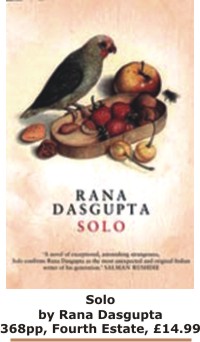Book Review
Strange
Music
 The dreamlike evocation
of a centenarian's life
leaves Kapka Kassabova The dreamlike evocation
of a centenarian's life
leaves Kapka Kassabova
dizzy with wonder
Since the fall of communism, the saddest kind of person you spot in the streets of Sofia is the pensioner sitting beside ancient scales, waiting for someone to come along who might pay for a chance to weigh themselves. You pass these survivors of multiple political experiments, look into their watery eyes, and wonder what you would find inside their heads if you could zoom in. Rana Dasgupta's first novel Solo provides the most epic, and yet most truthful answer: the 20th century, with all its agonies and its ecstasies.
Ecstasies are admittedly thin on the ground if you happen to be an ordinary Bulgarian like Solo's protagonist Ulrich. But the agonies are so fascinating that 350 pages later, I felt as vertignious as if I'd been galloping through the wilderness of European history.
Dasgupta, a young British-born Indian based in Delhi, who made his debut with a quirky short-story collection called Tokyo Cancelled, has set his panoramic novel mainly in Bulgaria. The first thing we learn is that Ulrich is nearly 100 years old. He lives in a crummy flat in modern Sofia, a chaotic city filled with television nonsense and noisy cats copulating at night. Ulrich is blind and his life has crumbled away. Neighbours look after his body while his mind wanders across the scenes of his life - and other people's, not all of whom are real.
Part one, Life, is a recollection of Ulrich's life. Ulrich's personality is unremarkable, he is an everyman. The first chapters seem emotionally remote, with stilted dialogue, but the story gathers momentum and begins to flower in unexpected ways. We find Ulrich growing up in prosperous but politically unstable turn-of-the-century Sofia. His mother lives in "philharmonic sadness" and his musical leanings are set straight by an authoritarian father who is himself destroyed "by chagrin" in the first world war and the Balkan wars in its wake.
Ulrich's chemistry studies in 1920s Berlin are interrupted by sudden poverty and he returns home, where his best friend is executed in anti-communist reprisals. His marriage fails and his son is removed from him. Ulrich's mother, despite being anti-Nazi, is sent to a labour camp by the new communist regime. Dasgupta has a neat way of sketching enormous traumas: "The former villains were cast in bronze and put up in the parks, and all the stories changed." The thugs who come for his mother "used the time they were waiting to smash the bookshelves". When his mother returns from the camps, broken, "it came to each of them to wake up, screaming in the night, and these submerged agonies were a form of silent compact".
When Moscow decides that Bulgaria will be "the chemical engine of the socialist countries", Ulrich is enlisted in the great five-year plan and has no choice but to become a star worker, spending "obscure hours" inside the new engine of this brave new world, until "the rivers ran with mercury and lead, and hummed with radioactivity". When he retires, he is given a gold watch and sent packing. He sets up a chemical laboratory in his flat, but the police dismantle it. Though "the undead leaders clung to office and alcohol", the regime collapses, and Ulrich drifts in the lawless "aftertimes" of thuggish opportunism. Then he accidentally blinds himself with acid. "But it is not a despairing conclusion," Dasgupta concludes with startling optimism, because Ulrich still has his daydreams, and this then takes us to part two where things turn very strange indeed.
In part one, the chapter headings are chemical elements because of Ulrich's thwarted love of chemistry. Here, they are obscure marine fauna because...well, words like beluga and narwhal sound strange. We are now in Bulgaria and, for some reason, Georgia, and follow the fates of three young people who are not Ulrich's lost children but might have been. They are three compelling, recognisable products of the post-communist freefall. Boris is born in a dead-end village and raised by a grandmother and gypsy musicians. Feisty Khatuna is determined to rise above the general misery the only way she can - by becoming a gangster businessman's mistress. Meanwhile, her brother, the poet Irakli, can't stop himself from falling through the cracks of these "aftertimes" - like so many bright young East Europeans in the 1990s lost to suicide and despair - not because he fails, but because he is tainted by a failed society. His nonsensical poetry is sprinkled through the story for no apparent reason other than to add yet more strangeness.
The three connect in New York, where Boris becomes a musical sensation, and where we are unsurprised to find the old Ulrich walking into their lives. When he meets his first love, a Jewish girl from Berlin long dead in the Holocaust, she points out that this is only a dream. "It's not only a dream," Ulrich replies. "There is far more to us than what we live." Because if we have no dreams of our own, we may well become someone else's nightmare. We may well not have existed.
Copyright
(R) thedailystar.net 2009 |
